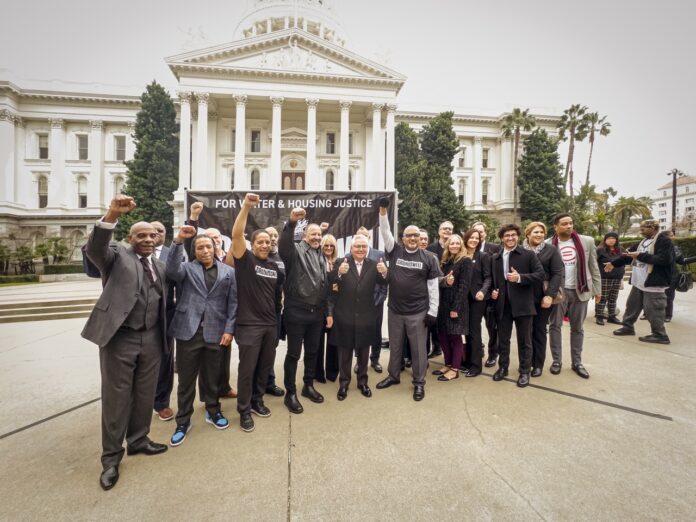
By Maxim Elramsisy, California Black Media
Last month, Groundswell for Water Justice, a grassroots advocacy group, joined civil rights leaders at the State Capitol in Sacramento. They demanded immediate action to address the state’s worsening water and housing crises.
A 2021 California auditor Report found that more than one million Californians lacked access to safe, clean drinking water. Two in three of those people, they found, were people of color. According to data from the US Census Bureau Annual Survey of State and Local Government Finances found that expenditures on drinking water infrastructure in California declined overall since 2010, but much of the infrastructure is old. The Los Angeles Department of Water and Power (LADWP) estimates that a third of their 6,780 miles of water pipes installed over 80 years ago will reach the end of their useful life in the next 20 years.
“I think the very first piece is making sure that the plight of the million Californians that don’t have access to water are being heard,” Groundswell for Water Justice spokesman Ed Sanders told California Black Media (CBM).
“Policy leaders can have an honest conversation about this but understand that there are human lives that are impacted. And that has to sort of be put at the front. That need is urgent, it’s sort of born of a legacy of discrimination, and needs to be addressed.”
California had one of its wettest years ever in 2023, following a harsh decades-long drought that left many of the state’s lakes and reservoirs dry, forcing Gov. Newsom to create water restrictions across the state.
“There’s not a silver bullet that solves all of this. I think, you know, obviously, we need to sort of look holistically at the whole water supply. Where the demand is, where the water is captured, how we convey it,” Sanders continued.
A coalition of community, civil rights, labor, and infrastructure leaders around the state combined efforts and resources to create Groundswell for Water Justice. The organization advocates for policies that improve the delivery of water by supporting small water system operators throughout the state which often serve low-income communities of color.
Groundswell advocates say extreme weather swings from intense heatwaves to powerful atmospheric rivers have required California to upgrade the water capture, purification, and distribution infrastructure, much of which is decades old and not built to support the nation’s most populous state. They contend that water infrastructure must expand if California is going to meet its housing mandates. Without proper water infrastructure, developers cannot get new housing approved.
Groundswell co-founder Robert Sausedo calls the water crisis the “civil rights issue of our time. He insists that conservation and construction are the two approaches that will solve it.
“Several 100 people who are directly impacted by this issue of clean safe drinking water joined us to raise their voices towards a clarion call for justice for the have-nots to share in the same privileges of the haves when it comes to water,” Sausedo told LA Focus at the rally.
“The goal now is to continue moving forward in our efforts to organize the state and bring on more organizations to participate with the 52 organizations across the state that are currently involved and advocate for those who are too often overlooked and to ensure that both state and federal legislatures continue to do the right thing for those who are disenfranchised when it comes down to one of the most critical needs — clean water,” he added.
California’s earthquake-prone environment presents an additional risk. According to former U.S. Geological Survey seismologist Lucy Jones, water infrastructure represents “the single biggest vulnerability we’re facing in Southern California.”
These risks can be mitigated, says Jones, by relying less on transporting water long distances and developing more local sources of water. However, there’s a built-in challenge with that solution. According to the California Department of Water Resources, the state received 75% of its rain and snow in the watersheds north of Sacramento, but 80% of the state’s water demand comes from the southern ⅔ of the state.
Among guest speakers at the rally were Richard Polanco, former State Senator; Antonio Villaraigosa, former Mayor of Los Angeles; Marc Morial, CEO and President of the National Urban League; Tony Thurmond, State Superintendent of Public Instruction; and more.
The California Aqueduct is infrastructure that is critical for water distribution in the state. Built in the 1960’s, it transports water 444 miles from the Sacramento-San Joaquin Delta to the agricultural breadbasket San Joaquin Valley, through the largest water lift, the Edmonston Pumping Plant, then stored in Pyramid Lake, Castaic Lake, and Lake Perris for distribution throughout Los Angeles, and inland empire cities.
Los Angeles imports water from the Sierra Nevada Mountain ranges via the 242-mile-long Los Angeles Aqueduct. Southern California imports water from the Colorado River via the 233-mile-long Colorado River Aqueduct.
California also gets water from groundwater, though water from these 515 subterranean basins is being extracted faster than it can be recharged. As a result, the available water from most groundwater basins is decreasing, according to the CDWR.
Advocates point out that water is and has always been a critical factor in shaping California’s population and economy. The balance of urban development, agricultural sustainability, and ecological preservation of watersheds (fish need water too) will be strained as Californians endure the effects of climate change.
The leadership at Groundswell for Water Justice says the organization is working to make sure that all people are represented in decisions affecting the livability of their communities.


